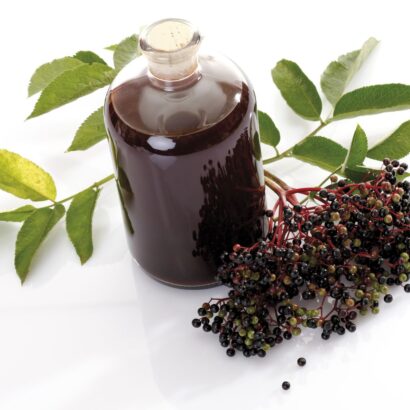Elderberry wine is one of a category of so-called “fruit wines,” meaning that they are wines made from some type of fruit other than grapes, in this case, elderberries. Elderberries are the fruit of a bushy shrub of the genus Sambucus, of which there are many species. But elderberry wine is made from either the blue elderberry (Sambucus mexicana) or the black elderberry (Sambucus nigris). Elderberries can be used to make still wines, sparkling wines, and sweet dessert wines.
Elderberry wine can be sweet, tart, and tannic depending on how the fruits are treated and sometimes compared to Port, owing to its dry, earthy flavor. It can also be aged in oak barrels. As fruit wines go, elderberry wine is perhaps the one that comes closest in flavor and body to grape wines.
Fast Facts
- Regions: Cooler regions
- Origin: Europe, North America
- Sweetness: Mildly sweet to very dry
- Color: Dark red
- ABV: 10 to 15%
Elderberry Wine vs. Elderflower Wine
Elderberry wine is sometimes mistaken for elderflower wine, which is a wine made from the flowers of the elderberry shrub, as opposed to the berries themselves. A quick way to tell the difference is that elderflower wine, which is made by fermenting the blossoms along with yeast and sugar, is a white wine, whereas elderberry wine is red.
Taste and Flavor Profile
Elderberry wine is a medium-bodied, acidic, tannic, dry, hearty red wine with flavors of elderberry, blackcurrant, blueberry, and cherry, as well as earthy notes. Depending on whether the wine is dry or sweet, and how long it’s aged, this profile can vary.
How to Taste Wine
Follow a few steps when tasting wine to ensure you have the best experience:
- Look: Take a good look at the wine, examining the color and opacity through the glass.
- Smell: Swirl your glass for 10 seconds and take a quick whiff. Then stick your nose into the wine glass for a deep inhale, taking in your first impressions of the wine.
- Taste: Take a small sip and let it roll around your mouth. Note the acidity, sugar, tannins, and alcohol content when first tasting, then move on to tasting notes (berries, spice, wood) and finally the finish.
Growing Regions
Elderberry wine has been made for hundreds, possibly thousands of years. It originated in Europe and was made in cooler regions, such as Britain, Germany, and Scandinavia, where grapes could not flourish. Elderberries are often planted as hedgerows, which means they would be readily available around homes and farms.
One English cookbook, compiled by a contemporary of Jane Austen, describes the process for making homemade elderberry wine, which involved foraging for the berries, simmering them, straining out the pulp, adding sugar and spices such as ginger, allspice, and cloves, adding yeast and then aging it in barrels, sometimes fortifying it with brandy to prevent spoilage. Thus, making elderberry wine was essentially a way of preserving the fresh elderberries.
Food Pairings
Elderberry is a full-bodied wine that works as a dinner wine, pairing well with red meat and game, especially steaks, hamburgers, short ribs, and other braised meat dishes such as pot roast or beef stroganoff, roast or grilled lamb, as well as portobello mushrooms and semi-hard aged cheese like cheddar or gouda. Alternately, some varieties, due to their fruitiness and acidity, pair well with spicy dishes like curries or Thai noodles, as well as strong cheeses like blue cheese, and desserts like ice cream, chocolate, caramel, and berries.
Key Producers, Brands, Buying Tips
Since growing enough elderberries to produce massive quantities of elderberry wine is not financially viable for most winemakers, elderberry wine remains a niche product. Some commercial winemakers do produce and sell elderberry wine, but it’s a specialty product. Your best bet, if you’re interested in trying elderberry wine, is to inquire at your local wine store. One particular brand that does consistently sell a product known as elderberry wine happens to be Manischewitz. However, their version is not true elderberry wine but rather made from concord grapes and flavored with elderberries.
On the other hand, because it is made in small batches, elderberry wine is a common wine for home winemakers to make themselves.
